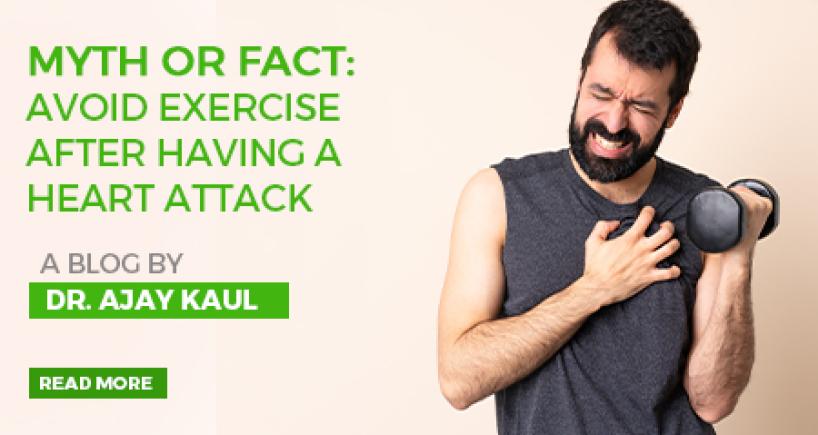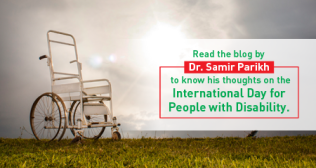
Cardiac Sciences
Myth Or Fact: Exercise Must Be Avoided After Having A Heart Attack
Myth Or Fact: Exercise Must Be Avoided After Having A Heart Attack Nov 19, 2021
 Recently we have seen many instances where young people who are in their early 40s have lost their lives out of a cardiac arrest or heart attack. But not necessarily every cardiac arrest or heart attack results in death. In many instances, depending upon patient’s health status, their lifestyle pattern, medications that they are taking, or how quickly they are treated after the attack, can save their lives. Day by day, with the increasing disease burden, every individual needs to take care of their health beyond everything. We have to keep in mind that, looking fit doesn’t always mean real fitness – so it is crucial to shift our mindset from reactive to preventive.
Many people doubt how much it is safe to work out after experiencing a heart attack. People assume that exercising after a heart attack might have an adverse impact on the heart but in reality, inactivity is worse for our heart and leads to an earlier death. According to American Heart Association, after a heart attack, maintaining regular exercise along with taking other strides toward improved heart health, ensure longer and as better quality of life. Aerobic exercise i.e., walking, jogging, swimming or biking, and the like — helps to keep the heart strong and healthy as it improves the blood circulation in the heart. Strength exercises are helpful for building stamina while stretching increases flexibility.
But we should keep in mind, that not all exercises are suitable for everyone. After a heart attack, including cardiac rehabilitation as a part of the treatment plan helps to accelerate the recovery process. Before engaging in any physical activity, especially for people who are already diagnosed with any cardiac issues, they must consult with a doctor to understand how much and what kind of physical activity is right for them. Usually, after overcoming a heart attack, doctors don’t recommend heavy exercise. In the beginning, after having a heart attack, one must start exercising very slowly, taking breaks in between. The justified amount and manner in which someone should work out after surviving a heart attack entirely depends on the damage to the heart. Monitoring heart health in frequent intervals should be done after a heart attack. It’s a myth that coming back to active life after a heart attack is impossible. Gentle walking is the best way to start, even if it’s just for five minutes. One should keep on practicing gentle walking for a small span of time until it feels easier and then gradually increase the time, and later the speed. One should aim to exercise for 15–20 minutes at a time in the first four to six weeks. Doctors suggest exercising in mild weather or indoors in order to maintain the required balance in the body temperature during a workout. But, if someone feels shortness of breath, pain in the chest, arm, or jaw, uneven or fast heartbeat while working out or post-work out, seeking immediate medical consultation is a must.
There are many reasons why regular exercise needs to be an important part of our life following a heart attack. Regular physical activity not only reduces the early death risk out of cardiovascular disorders, but regular exercise also lowers the risk for non-cardiac-related causes of death. As exercise is considered to be a crucial part of managing healthy body weight, it helps in managing type 2 diabetes, hypertension, and cholesterol – all of these are threats to our heart health. Overall, physical exercise is useful to manage stress and anxiety and it ensures a quality of life. So, with the doctor’s advice, everyone should follow a healthy diet and routine exercise to live an active life even after having a heart attack.
Recently we have seen many instances where young people who are in their early 40s have lost their lives out of a cardiac arrest or heart attack. But not necessarily every cardiac arrest or heart attack results in death. In many instances, depending upon patient’s health status, their lifestyle pattern, medications that they are taking, or how quickly they are treated after the attack, can save their lives. Day by day, with the increasing disease burden, every individual needs to take care of their health beyond everything. We have to keep in mind that, looking fit doesn’t always mean real fitness – so it is crucial to shift our mindset from reactive to preventive.
Many people doubt how much it is safe to work out after experiencing a heart attack. People assume that exercising after a heart attack might have an adverse impact on the heart but in reality, inactivity is worse for our heart and leads to an earlier death. According to American Heart Association, after a heart attack, maintaining regular exercise along with taking other strides toward improved heart health, ensure longer and as better quality of life. Aerobic exercise i.e., walking, jogging, swimming or biking, and the like — helps to keep the heart strong and healthy as it improves the blood circulation in the heart. Strength exercises are helpful for building stamina while stretching increases flexibility.
But we should keep in mind, that not all exercises are suitable for everyone. After a heart attack, including cardiac rehabilitation as a part of the treatment plan helps to accelerate the recovery process. Before engaging in any physical activity, especially for people who are already diagnosed with any cardiac issues, they must consult with a doctor to understand how much and what kind of physical activity is right for them. Usually, after overcoming a heart attack, doctors don’t recommend heavy exercise. In the beginning, after having a heart attack, one must start exercising very slowly, taking breaks in between. The justified amount and manner in which someone should work out after surviving a heart attack entirely depends on the damage to the heart. Monitoring heart health in frequent intervals should be done after a heart attack. It’s a myth that coming back to active life after a heart attack is impossible. Gentle walking is the best way to start, even if it’s just for five minutes. One should keep on practicing gentle walking for a small span of time until it feels easier and then gradually increase the time, and later the speed. One should aim to exercise for 15–20 minutes at a time in the first four to six weeks. Doctors suggest exercising in mild weather or indoors in order to maintain the required balance in the body temperature during a workout. But, if someone feels shortness of breath, pain in the chest, arm, or jaw, uneven or fast heartbeat while working out or post-work out, seeking immediate medical consultation is a must.
There are many reasons why regular exercise needs to be an important part of our life following a heart attack. Regular physical activity not only reduces the early death risk out of cardiovascular disorders, but regular exercise also lowers the risk for non-cardiac-related causes of death. As exercise is considered to be a crucial part of managing healthy body weight, it helps in managing type 2 diabetes, hypertension, and cholesterol – all of these are threats to our heart health. Overall, physical exercise is useful to manage stress and anxiety and it ensures a quality of life. So, with the doctor’s advice, everyone should follow a healthy diet and routine exercise to live an active life even after having a heart attack. 


















